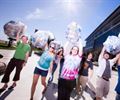
 Sometimes, what goes on behind the scenes is as important as what happens in full view – especially when it comes to UC Merced’s pledge to uphold and develop new sustainable practices.
Sometimes, what goes on behind the scenes is as important as what happens in full view – especially when it comes to UC Merced’s pledge to uphold and develop new sustainable practices.
All across the campus, sustainability is on the minds of hundreds of staff members who, every day, push the university closer to realizing its Triple Zero Commitment to consume zero net energy, produce zero landfill waste and produce zero net greenhouse gas emissions by 2020.
Sustainability is the guiding principle in campus design, planning and operations – that’s obvious from the fact that UC Merced is the only university in the country where all its buildings are LEED certified. UC Merced also has a 1-megawatt solar array that helps power the campus, and the Central Plant, an iconic campus structure where water is heated or chilled during nonpeak times to warm or cool classroom and office buildings and save the campus big bucks.
But did you know sustainability also informs everything from cleaning supplies and grounds maintenance, to the teaching, research and how the campus purchases all of the thousands of supply items that keep it running?
“It all gets discussed and evaluated constantly,” said Zuhair Mased, the campus director of energy and sustainability. “We even think about the proper locations for trash and recycling bins to offer maximum accessibility to users and to the people who empty them.”
Ever wondered why UC Merced serves only Pepsi products? It’s because Pepsi offered the best deal on its soda products, plus compostable cups and money for sustainability programs.
Cindi Deegan, director of purchasing, said she has negotiated a variety of sustainability benefits into supply and service contracts, including compostable cups, energy-efficient vending machines and locally sourced food, parts and labor.
She, like many others, constantly thinks strategically about sustainable sourcing opportunities when negotiating contracts for equipment, supplies and services. This strategic focus may include considerations such as where campus food comes from to where, how and with what materials furniture is manufactured and even how it is transported.
“We’re trying to model things that can be copied,” Deegan said. She hopes UC Merced will become the systemwide model for sustainable procurement practices.
Campus planners and leaders look for creative solutions to even the smallest issues, like how long it takes to get hot water in the residence-hall showers. By using water heaters with wrap-around water coils, they save money and have hot water faster because the water in the coils keeps the water in the tanks warmer longer.
The campus’ Sustainability Committee is always looking at ways to improve practices, from incorporating more sustainability ideas into curriculum to encouraging people to use campus transportation,
Sustainability leaders urge people to employ network printing – having a pod of printers and copiers serving a large group of people – rather than everyone having his or her own printer. It saves energy, paper, ink and toner cartridges.
“Printers take up space, and they sit idle most of the time,” Deegan said.
Or take an idea Sustainability Coordinator Ashley Chiang came up with: Save all the paper you can that has only been used on one side, and reuse it. She had a stack bound into a spiral notebook for her boss, Mased, so he will always have a notepad with him, and they are working on ways to promote the idea across the campus.
Chiang said she started by asking everyone she knew to save just the banner sheets from their printers – the first page that comes out whenever the printer performs a self-test, and usually bears the logo of the printer company.
“In a couple of months, I had a huge stack,” Chiang said. “I still have some of the paper.”
They urge people to unplug items that are not being used, remember to turn off their office lights and computer monitors at night, recycle and reuse whenever possible and be mindful not only of the cost savings, but the impact on the environment.
Sustainability leaders collaborate with sister campuses to see what everyone else is doing and whether any of those ideas can be implemented at UC Merced.
They are coming up with long-term plans, too, including replacing all the campus’s light bulbs with LED lights, which can last up to 20 years, and are less expensive and far more energy efficient.
They’d like to implement an online temperature-control system where building users can close or open shared air vents to heat or cool rooms. If a room is not in use, the vents can be closed off to save energy.
But all these ideas, plans and programs cannot work without one crucial component: you.
The entire campus community is encouraged to maintain sustainable habits and also to bring new ideas to Facilities Management. Mased said people can stop by any time to talk about sustainability.
“We partner with everyone here to create and maintain a sustainable campus,” Mased said. “We can design the most energy-efficient buildings in the world, but it’s up to the tenants and users to keep it going – to be part of that legacy.”
Lorena Anderson

Senior Writer and Public Information Representative
Office: (209) 228-4406
Mobile: (209) 201-6255






